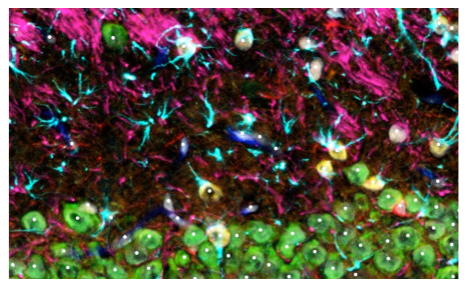

UH research team received a $3.19 million grant from the NIH for research on a new brain imaging technique. | Courtesy of Badri Roysam
Badri Roysam, UH chair of electrical and computer engineering, and his research team received a $3.19 million grant from the National Institutes of Health for their work in developing a new brain imaging technique.
Roysam has been working in collaboration with Dragan Maric from the NIH on a project designed to speed up drug development for common brain illnesses using innovative brain mapping technology.
He said his inspiration for the project came from the necessity of gaining a deeper understanding of the brain’s processes and the lack of modern technology accurately depicting its intricacies.
“Microscopes don’t reveal the brain’s complexity to any substantial extent, they actually give a very narrow view of the brain,” said Roysam. “We started asking the question, ‘what if we could see the effect of the drug as well as its side effects at the same time?’”
This imaging technique operates through the use of biomarkers and immunostaining methods to map unhealthy brain tissue in great detail, allowing many different angles of the brain to be analyzed at once.
”We developed a technology that reveals the activities of anywhere from 50 to 100 proteins of interest in a very comprehensive way,” Roysam said. “We are trying to match the complexity of the brain, at least to a certain extent.”
An on-campus supercomputer is then able to generate quantitative readings of these images, which are useful in revealing brain injury, the drug’s efficacy and its potential side effects.
The benefit of adopting a more detailed brain screening technique is that it has the potential to speed up the drug development process. This is especially true for drugs aimed at treating concussions and even certain psychiatric conditions.
“There are more than 40 million concussions happening each year, and still no effective treatments for it,” said Roysam. “The same story is true for many other brain diseases such as stroke and Alzheimer’s.”
This work is aimed at the pre-clinical phase of drug development, where both animal tissue and human post-mortem tissue are used to understand how brain lesions progress and the role drugs play in slowing this process.
“We’re hoping that this technology will reveal the mechanisms by which drugs work and when these mechanisms become apparent, it will help to essentially sort through candidate drugs,” said Roysam.
“Brainwork is difficult, so it’s important that we develop better tools and techniques to improve our understanding, and that’s what we aim to do with much of our work.”
news@thedailycougar.com
—
“NIH awards UH research team $3M grant for new brain imaging research” was originally posted on The Cougar
